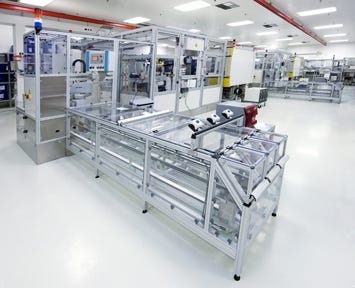Wilden restructures R&D center; switches hydraulics for electric presses
Just days after parent firm Gerresheimer announced the sale of its automotive components molding operations, processor Gerresheimer Wilden says it has reorganized its technical center to help speed its work on new developments in the pharmaceutical, diagnostics and medical industries. The company also is replacing a squad of hydraulic presses with new all-electric ones from Swiss manufacturer Netstal.
July 17, 2009
Just days after parent firm Gerresheimer announced the sale of its automotive components molding operations, processor Gerresheimer Wilden says it has reorganized its technical center to help speed its work on new developments in the pharmaceutical, diagnostics and medical industries. The company also is replacing a squad of hydraulic presses with new all-electric ones from Swiss manufacturer Netstal.
|
At its Technical Competence Center (TCC) in Wackersdorf, Germany, the company says it has torn down its previous two-tier approach to responsibilities for both medical and technical plastic systems and replaced this with a new structure that introduces additional departments for research and development of polymers, materials and process engineering, and for product and process development. By pooling its expertise and encouraging cross-divisional, interdisciplinary teams, the molder hopes to save time and money on new projects. “Our customer requests are becoming increasingly exacting,” said Gösta Pretel, the TCC’s director. “Often, projects involve the production of complex systems with numerous injection molded components and different bought-in parts, which requires technically demanding post-processing procedures.”
Following the recent divestment of the technical plastic systems’ division and its new focus on medical plastic systems, the company has molding facilities in Pfreimd, Germany; Küssnacht, Switzerland; Horšovský Týn, Czech Republic, Peachtree City, GA, and Dongguan, China. At the Küssnacht facility it has begun replacing nine hydraulically driven injection molding machines with ‘Elion’ all-electric presses from Netstal, and also raise its automation level on the lines. The new machines will continue running a program for an unidentified diagnostics specialist, molding cuvettes on 64-cavity molds 24/7. Wilden officials would not identify how many new presses were acquired.
The Küssnacht facility specializes in manufacturing disposable diagnostic products such as cuvettes, which are disposable containers for samples and reagents used for optical tests such as blood typing for blood donations and transfusions. In order to produce precise test results, cuvettes must neither react with the test substances nor display flaws such as contaminations or scratches.
In the past this cuvette project has been supported by nine, 1500-kN hydraulic toggle-clamp injection molding machines with 64-cavity molds and parts removal systems. According to Wilden officials, the transition to electric molding machines also will allow it to improve its parts removal system, which it says has required a considerable amount of manual handling. Removal from the existing lines involves taking out the cuvettes, checking them for leaks and placing them into one of sixteen trays, which are then automatically emptied into bubble bags. The exact number of items is determined by part counting scales. When the mold opens, the sprues drop onto a conveyor belt below and are removed.
The new Elion machines will be slightly larger, 1750-530 machines with clamping forces of 1750 kN. On the new presses and production cells, the cuvettes are removed together with the sprues, checked for leaks, filled into bubble bags and labeled. —[email protected]
About the Author(s)
You May Also Like



